Helen Lowe's Blog, page 313
December 26, 2010
Short Story: Heartland
"Too far south for bougainvillea." That was Ted, his tone absolute, the week before he and Jessica got married.
Jessica had not replied at the time, but brought the bougainvillea anyway, taking cuttings from her mother's garden. She still remembered that afternoon, the sun dancing on the path while every corner was filled with moss and shadow. Mysterious, Jessica had thought, seeing it as if for the first time, when it was to be her last. But she had grown up with the bougainvillea's cascade, crimson down a white wall, and would not call any place that was without it home.
"You're wasting your time," Ted said, when she planted the cuttings along the verandah of a house where everything was new for both of them, the echoing interior and the flat expanse of paddock he called a lawn. "The first frost will kill them."
The first frost hadn't killed them, but the cuttings struggled for several seasons. The summers were hot and dry, relentless as the nor'west wind, the winters arid and cold. Jessica found it a strange, bleak country when she first arrived, not without an austere beauty, but hard, and moulding the men and women who lived there into its own pattern.
Despite Ted's predictions, the bougainvillea took hold. Jessica could not have said how, herself. Sheer willpower, perhaps – on her part, and the plant's. Soon everyone wanted it, as decoration for weddings and any number of other, special occasions. They would drive for miles to get it, jolting up the long drive that Ted refused to seal. "Keeps the time wasters away," he said, and would disappear at the first slow mutter of an engine up their hill.
It was Jessica who went to meet the visitors, standing beneath the coronal of bougainvillea with the door flung wide behind her. She always kept the door open to let air flow through, and in the afternoons she would sit on the verandah and look out to brown hills and the slash of pale sky. But what she saw was branching green, and the fern filled shadow of northern afternoons.
Margaret had loved the bougainvillea too. She was their only grand-child, orphaned during the War, and always said that she would be married beneath the bougainvillea's bravura colour – one day, when she was grown up. Jessica had smiled, and seen it happening – one day – in her mind's eye. Even after Margaret went away, first to study and then to find work, Jessica kept her room clear. Margaret had liked it plain, and would never have any curtains at the window. She wanted to look out to the ocean, stretching away, and have the sun creep through to wake her in the mornings.
"But what about at night?" Jessica asked once.
"Then I can count stars," Margaret had replied, quite seriously. "Or watch the lights of the fishing boats. They dance, you know, when the wind blows."
She had written from overseas about lights dancing: the lights of New York along Broadway, and streaming out beneath Brooklyn bridge. It was odd, Jessica had thought, how someone from so remote an area could fall beneath the spell of such a vast city. The pace of life, Margaret had written, was fast, and Jessica tried to imagine it all – the dancing lights and the skyscrapers, and streets where the cars crawled like ants, but her mind rebelled.
She had always been sure that Margaret would come home one day. In the meantime, the letters with New York postmarks were news in the district, important enough for Johnny Kahu to bring up the long drive in person.
"Nice fat envelope this time," he said to Jessica one day. "There'll be news in it."
He was right, there was news in it. Jessica stood by Margaret's window for a long time afterwards, looking out. She was aware of Ted standing in the doorway, waiting, but she couldn't bring herself to turn, not yet.
How big the sea is, she thought. The horizon seemed a very long way out, stretching into a forever that you could never touch, but only follow, as Margaret had followed. So far away, thought Jessica, looking, so far …
"Margaret's married," she said, without turning around. "She's met someone in New York, and they decided not to wait. They got married in the registry."
Ted said nothing. After a moment, she heard him walk away, and then the creak of the screen door as he leaned against it, putting on his boots.
Margaret, thought Jessica. Our little girl. She turned and looked at the room, the stillness of it, and the long waiting. There was a blue jar on the dresser, with a chip in it. Jessica still remembered the day Margaret had spent all her pocket money buying it – she hadn't cared that it was chipped.
"Think how it'll look with the bougainvillea in it," she'd said, her face bright with vision. "Just like a picture in a magazine."
And now she lived in New York, where her vision brought colour into other people's lives, doing set designs for Broadway shows, and arrangements in glossy periodicals.
Jessica wondered if Margaret had even considered coming home, or giving them the chance to go over there and see her married. She asked herself whether she would have had the courage to go so far, but didn't know the answer. She never would know now.
There was a table on the verandah, at the end enclosed on three sides by glass; it had come from the school and there were years of ink stained into the wood. Jessica set the blue jar down and filled it with bougainvillea. Crimson spilled over blue, and water reflections rippled across wood.
"She'll never come back, you know," said Ted. "Not now." He was standing on the front steps, but wouldn't come any further, not with his work boots on.
Jessica looked at him, her hands still resting among carmine flowers, each one fragile as hope, growing in a harsh climate. "She might," she said. "One day."
—
(c) Helen Lowe
Published in Bravado 15, 2009
Highly Commended, Thames Intermational Short Story Competition 2007
—
To celebrate Christmas-New Year I am posting a mix of fiction and poetry by myself and others that I feel fits the season in some way. Starting with Helen Rickerby's Burning with Joan of Arc on Tuesday—and she also featured my poem Christmastide—I have followed with A Norwest Season, Howard Thurman's "When the song of angels is stilled …" on Christmas Day and a Keri Hulme poem yesterday. Heartland is the first prose work—and I hope you enjoy.
December 25, 2010
Earthquakes, Wine, Food … & A Poem by Keri Hulme
Just when you thought it was safe … Things have been quietening down a lot on the Christchurch earthquake front lately, with shakes coming both less often and being less pronounced when they do occur. Until the wee small hours of this morning when we had a 4.1 and 3.7 in quick succession, both centred right on Christchurch and very shallow, 5 km and 6 kn respectively. And another jolt just 10 minutes ago, rattling through like a freight train—yup, they really do sound just like that!
So that makes it 4101 quakes in total since 4 September, although some of them are so slight that most of us really don't notice them anymore.
But quakes and shakes aside, yesterday was a great Christmas Day, plenty sunny but not too hot because the easterly was blowing—which in Christchurch comes in off the ocean, so always cools things down a bit. And you will be pleased to know that the menu that could all either be grilled or chilled was a great success. The eye fillet (mignon, not tournedos) in particular was a great success: marinated, cut into 5 individual steaks, seared in the pan then finished under the grill, before being served with a mushroom sauce. And the dessert of lemon & limoncello mousse served with fresh raspberries simply engendered the universal accolade of: "yum."
And the wine? Only NZ wines were served: the Quartz Reef Methode Traditionelle from Central Otago (as the aperitif); Pegasus Bay Cabernet Merlot from Waipara (just north of Christchurch) with the steak; and the Mission Ice Wine (from Hawkes Bay) with the mousse and raspberries. They were all wonderful—carefully selected, of course!  —but I particularly note the ice wine, which had a luscious caramel note, reminiscent of the topping on creme brulee. Again—yum!
—but I particularly note the ice wine, which had a luscious caramel note, reminiscent of the topping on creme brulee. Again—yum!
Continuing the food and poetry theme that has characterised Christmas on " … Anything, Really" so far (although it "might" be prose tomorrow …), Keri Hulme, author of the Booker Prize-winning and internationally renowned novel, The Bone People, sent me this poem just before Christmas and had kindly allowed me to share it with you. The food referenced in the poem is traditional NZ food or kai associated with Keri's Maori heritage; the singer, Ana Hato, was very well known in NZ in the 1930s and 1940s in particular.
—
A Poem, while listening to a dead but wonderfully alive voice, Ana Hato
These dough balls are sticky
but the oil is hot
… Now is th' hour
I've left them to rest
taua, but
I wont add the golden syrup
just a bit
– o muttonbird fat
"ka mate hoe te aroha'
how
can I combine the sacred
while Ana sings beautiful
moe mai e tama profane–
ka hoki mai ano
the kumara & dough
with the good greens she could not
get enough of
dying so early
come little Maori maiden
–o! hear them sing!
Aue! Aue!
Home home
wairua e
(c) Keri Hulme
Reproduced here with permission—and thanks!
December 24, 2010
Merry Christmas!
When the song of angels is stilled
When the star in the sky is gone,
When the kings and princes are home
When the shepherds are back with their flock,
The work of Christmas begins:
To find the lost
To heal the broken
To feed the hungry
To release the prisoner
To bring peace among people
To make music in the heart
—
Howard Thurman
Fellowship of Reconciliation
—
I am not sure if this is a poem, but a friend gave it to me as such my first Christmas in Sweden and it has remained my favourite Christmas poem ever since. Merry Christmas to you all.
December 23, 2010
Christmas Is Coming …
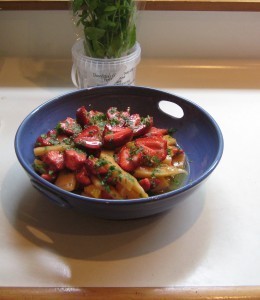
"Kiwi" Christmas fare
Well, actually, I think it's here already—and although I've been putting off the day, this morning I bit the bullet and went 'out there' to get in all the Christmas supplies, namely food and wine. And because this is New Zealand, i.e. southern hemisphere and height of summer, and also—as I mentioned in yesterday's post, hot-hot-hot right now—the main thought that informed my purchasing foray was that no way, under any circumstances whatsover, was I buying anything that required the oven to be switched on. "If it can't be served either grilled or chilled," my thinking ran, "then I ain't buying it!"
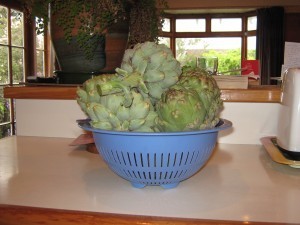
Garden fare--just in time for Christmas!
And I didn't. But this being the height of summer, as mentioned above, there's lots of great summer food that can be grilled, steamed, stir-fried, chilled, or served 'as it comes' that will still make the Christmas board festive. The foods I bought today include: strawberries, raspberries and cherries, sweetcorn on-the-cob, asparagus and snowspeas and bell peppers, new potatoes, oysters, and the meat–definitely for the grill, not the oven–is an eye fillet of beef. There's a few other things in the mix as well, but I still think I have the makings of a Christmas Day feast in all that, even if it is not traditional "trimmings."
I did mention wine as well, didn't I? According to the wine shop proprietor, Christmas is the one time of the year that both 'bubbles' ('methode traditionelle' to the more rarified out there, and real-deal champagne for those not on a budget  ) and dessert wine ('stickies') are bought in large numbers—so of course I bought both. ("Chilled"—got it? [Winks])
) and dessert wine ('stickies') are bought in large numbers—so of course I bought both. ("Chilled"—got it? [Winks])
And going outside of wine, just briefly, limoncello—so there can be limoncello & lemon mousse to go with the Christmas Day raspberries!
Some of you may be saying: hold on, it's only the 23rd. Not so, I reply: this is not just the southern hemisphere, it's also New Zealand, the first country in the world to see the sunrise—for me, today is Christmas Eve and more than time to be thinking about Christmas fare.
I also promised you poetry and stories for the season. Yesterday's poem was A Nor'west Season. Today, I'm referring you to Helen Rickerby's Winked Ink blog, where she featured my poem Christmastide as her Tuesday Poem.
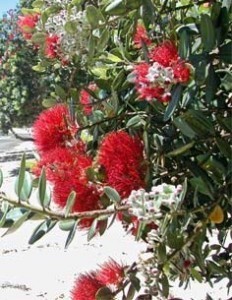
Metrosideros excelsa; aka "crimson"
I was very pleased when Helen chose to feature this particular poem, because to me it is quintessential New Zealand Christmas—the heat, the vegetation flowering, the odyssies we all make to reconnect with friends and family around the country. Usually though, the pohutakawa doesn't flower at Christmas; it's just a little earlier, in mid-late November, early December. But the year I wrote Christmastide was anomalous for some reason and the pohutakawas were all flowering late, so my journey north, to Hamilton and then Auckland, was coloured crimson.
Worth a poem, I thought, especially as it was another really hot year. So click on the link and enjoy!
December 22, 2010
Tis A Nor'west Season
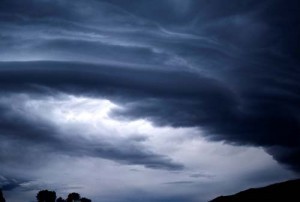
Nor'west Arch (Photo by Christina Troup)
You may recall that yesterday I said it was "hot hot hot." OK, I just said "hot", but the plural is more fun! And since it has gotten hot enough to set off the fire alarm in my writing study not once but twice now, I think the repetition is justifiable …
More than that though, it's high summer, solstice in fact, here in Canterbury and that means 'tis a nor'west season—the dry, hot, blusteringly strong wind that sweeps in from the nor'west and generally creates havoc. Just to give you an idea, a friend emailed this morning to say that one of the trees on their lifestyle block had fallen, taking out a considerable portion of the vegetable garden and the shed that her husband had been inside just a few moments before. And being a hot, dry, strong wind in the height of an already hot dry summer, this round of norwesters has fanned a rash of fires—as well as blowing down trees!—in and around Christchurch. Nothing on the scale of Australian bushfires, but enough to keep the fire services feeling stretched over these past few days.
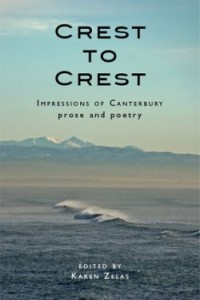 Heralded by the distinctive cloud formation known as the nor'west arch, the nor'wester is similar to the chinook, the Santa Ana, and the sirocco (in other parts of the world) in being a foehn and/or katabatic wind, i.e. amongst other things, it gives you an exciting ride when coming into land at Christchurch airport. The nor'wester also has the same reputation as its fellow foehn winds for affecting emotional as well as physical equilibrium when it blows for days on end—all qualities that I have tried to capture in my poem A Nor'west Season
Heralded by the distinctive cloud formation known as the nor'west arch, the nor'wester is similar to the chinook, the Santa Ana, and the sirocco (in other parts of the world) in being a foehn and/or katabatic wind, i.e. amongst other things, it gives you an exciting ride when coming into land at Christchurch airport. The nor'wester also has the same reputation as its fellow foehn winds for affecting emotional as well as physical equilibrium when it blows for days on end—all qualities that I have tried to capture in my poem A Nor'west Season
—
A Nor'west Season
Waiting . . .
the nor'west arch a pale slash
along cloud-filled sky, promises heat—
big bluster coming
beating in across the plains lifting
roofs tossing down
trees a dog howls
into the sun's glazed eye
falls back into shadow
beneath a car body
propped on a rusted jack waits
for the lull . . .
—
© Helen Lowe
Published, Crest to Crest: Impressions of Canterbury Prose & Poetry, Ed. Karen Zelas, Wily Publications, 2009
December 21, 2010
What's Gone Down … What's Coming Up
On Monday I posted about finally finishing Part 3, which is one of the two really big (of four—although I'm thinking of re-jigging the order so four may become five) sections of The Wall of Night Book Two, aka as (working title) The Gathering of the Lost.
And yesterday was the long-awaited Tuesday Poem Blog Christmas Exchange, where I got to feature fellow poet Helen Rickerby's Burning with Joan of Arc, while Helen featured my poem, Christmastide on her Winged Ink blog.
Other stuff that's been happening lately includes the end of the radio station year (that's Plains 96.9FM), so no more interviews or podcasting for me until February. But there's still some great recent book—and other—interviews from Women on Air that you can listen to on podcast, here, over the break.
And last Thursday, you may recall, I was performing as part of Mer Made, a combination music and poetry-in-performance event at Beat St Cafe. It was a fun evening, the joint was jumping–and I forgot to take photos for you! So you'll just have to take my word for it, but next time … 
—
What's Coming Up …
Well, just to prove that I've obviously been very wicked in some past life if not this one, it's straight into the fourth and final part of Gathering for me, but as I also said on Monday I am hoping that will be very much an epilogue and therefore a short and smooth write. Fingers crossed!
And of course there's Christmas and New Year's Eves and Days, which I do plan to have off, because it's my personal view that if there are only two days in the year able to be dedicated to spending time with friends and loved ones, these are those two days. So that's exactly what I'll be doing.
But because it's "hot as" here in Christchurch at present I have scotched the idea of a Christmas Day roast and will be doing something quick on the grill, with something "chilled" in nature for dessert—and possibly to quaff as well. 
The other thing I'll be doing over the break, right here on " … Anything, Really", is bringing you a selection of poetry and prose by myself and others that somehow speaks to me of the season. This is my gift to you as followers of my blog and I hope you will enjoy.
December 20, 2010
Tuesday Poem Christmas Exchange: "Burning with Joan of Arc" by Helen Rickerby
The yellow sand is hot under my palm
Despite my shorts and tee shirt
and slatherings of sunscreen
I can feel the sun
scorching my skin
Joan is stretched out beside me
sun hat over her face
bikinied body idolatrous
worshipping the sun
'More sunscreen?' I ask
'I've already burned,' she says
'I was burning with the words
given by God
I burned for my people
burned in battle
I was burned when betrayed by my king
burned with shame when they made me a witch
and you know of course
about the English flames'
'So yes,' she says
'I'd love some more sunscreen'
(c) Helen Rickerby
Published in My Iron Spine (Headworx) 2008
—
Helen Rickerby is the author of two collections of poetry: Abstract Internal Furniture (2001) and My Iron Spine (2008), and recently had a sequence of poems, Heading North, published in a hand-bound edition by Kilmog Press. She is co-managing editor of JAAM literary magazine and runs Seraph Press, a boutique poetry publisher. She lives in Wellington, in a cliff-top tower, and works as a web editor.
To find out more about Helen and her wonderful poetry, you may visit her on her blog Winged Ink. To read her guest post on the recently released JAAM 28: Dance Dance Dance, which she co-edited, click here.
—
About the Christmas Exchange:
Basically, the Christmas Exchange comprises the poets of the Tuesday Poem Blog pairing up and featuring one of the other's poems on their site—all in celebration of the Christmas and New Year festivals! I was delighted to be paired with Helen Rickerby, whose poetry I admire immensely, and even more delighted when I read the poems Helen sent me. I liked both of them very much but I have to say that Burning with Joan of Arc really spun my poetic wheels.
Firstly, because it's very powerful poetically—this is a poem that packs a lot of punch! (Fittingly, of course, for Joan of Arc.) The power is achieved through a number of devices: the use of dialogue and 'voice'; the spare language juxtaposed with repetition, particularly around "burned" and "burning." We all have our personal prejudices and preferences as poets, and one of mine is a wariness of repetition: I find it tires very easily as a device, and risks boring the reader and dragging a poem into the banal. But in this poem it works perfectly—so much so that it was only on the second reading that I even noticed that there was repetiton. (At first reading I just went: wow.")
I really don't like breaking poems down—if they work as a whole then that's good enough for the Lowe gal! And this poem definitely works as a whole. But because this is the Christmas Exchange I want to talk about a couple of other aspects that make Burning with Joan of Arc rock for me. For example, how quickly and effectively Helen creates the atmosphere of the poem through words such as "yellow", "palm" and "scorching" in the first stanza; then the way in which she juxtaposes the macro story of Joan of Arc, her life and death, with the minutiae of the beach expereince: sunbathing and a conversation around sunscreen. The latter gives bathos to the former, but in such an understated way that as a reader you don't see it coming—and even after it's gone the effect is so neat that rather than flagellating over the glory and tragedy and injustice of Joan of Arc's life, you are left simply with a feeling of satisfaction: for the poem well conceived and delivered, as well as for the "story" effectively told.
For those who might argue that it is not a NZ Christmas poem: of course it is! NZ Christmas is all about high summer, and beaches, and sunscreen, and Burning captures that perfectly. Given that Joan of Arc has been canonized as a saint, I also feel that it is timely to reflect that a festival that promises "peace on earth and good will to all" has many times delivered "not peace but a sword"—together with the stake, the rack, the wheel, and the cross. Not a reason to turn away from the promise that offers better hope, but an incentive, as individuals and societies, to strive harder to realise it in the world.
And on that note—enjoy Helen Rickerby's Burning with Joan of Arc.
To enjoy more Tuesday Poems as part of the international Christmas exchange, go to the Tuesday Poem Blog hub here or click on the Quill icon in the sidebar.
December 19, 2010
"I Did It! I Did It!"
Title to be hummed to the tune of the song!
But yeah, I've done it—finished Part 3 of WALL2. Cover your ears for the "Great Shout" (reference: Patricia McKillip's The Riddlemaster of Hed—a seminal and fantastic trilogy, so if you haven't already read it, hie thee to a book store or library!)
You'll recall on Saturday that I thought I was closing on the target fast and hoped to see you on the other side? Well, 'the other side' turned out to be Sunday evening and not Saturday as I had first hoped, and 14.5 hours, 5437 completely new words written and 3134 revised—but we got there. This is it, the other side.
And you know what else, my gut is telling me it's good, that I've nailed it—so now I'll just have to find out whether all those editors and my official readers agree! (The one reader who has seen most of Part 3 so far does agree—but his is only one opinion, albeit a reliable one up until now!)
Where to from here? That would be Part 4, but if the Muses are kind, the story arc will be fulfilled and Part 4 will be very much epilogue to the main—and I hope, to use Mary Victoria's word, "rambunctious", action in Parts 1, 2 and 3.
Although of course, being a Helen Lowe story, it is all about danger and wild flights, sword fights and intrigue, as well as "dark treachery and conflicting loyalties", there is also a little bit of romance in there—because much of the action takes place in a part of Haarth, which while being most famous for its heavily armoured knights, also as a long tradition of "springtime love" …
December 18, 2010
What I'm Reading
Well, it's more "to be read" this week, but on my TBR table I have:
William Gibson's Zero History (having recently read and enjoyed Spook Country.)
 Justin Cronin's The Crossing (comes highly recommended!)
Justin Cronin's The Crossing (comes highly recommended!)
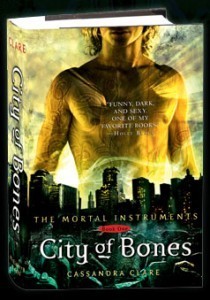 The 3-book set of Cassandra Clare's Mortal Instruments series ahead of a potential radio interview next year.
The 3-book set of Cassandra Clare's Mortal Instruments series ahead of a potential radio interview next year.
How about you, what are you reading?
December 17, 2010
What I'm Doing
Right now, I'm working hard chasing down that mirage-like conclusion to Part 3 of WALL2—but the target is in sight and I'm closing fast, so that's the mission for today! See you on the other side (I hope) …
I'd still be interested to hear your thoughts on ground breaking—or should that be "space breaking"?—scifi, as per yesterday's post.




